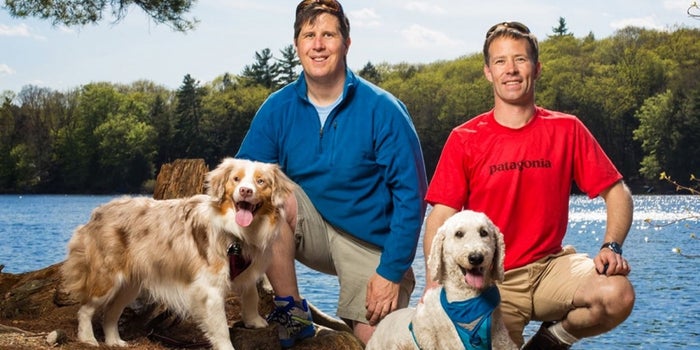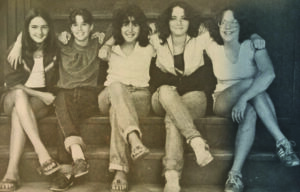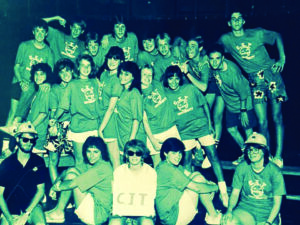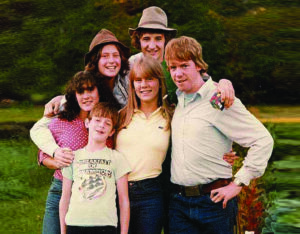How old were you when you started Camp?
11 years old. 1980-1991; Camper 1980-1983; CIT 1984; LIT/junior counselor (whole summer) 1985; Cabin counselor 1986-1988 (archery staff); Program Director 1989-1991.
How were you introduced to Camp?
My parents had some friends, from my father’s time in the Air Force, who lived in Claremont, NH. They’d heard about Camp Coniston from their children’s friends so they told us about it.
Did you attend college, and if so, what did you study?
I attended the University of Massachusetts, Amherst where I studied music. After that (and a gap year where I lived with three other former Coniston staff: Peter Twadell, Lael (Lambert) Jepson and the late Denice (Brigante) Choiniere in Burlington, Vermont), I attended Seton Hall University Law School. I should also note that, after law school, I lived for a couple of years with another former Conistonian, Rick Hutchinson.
What is your current job?
I am currently the presiding hearing officer (judge) for the Vermont Judicial Bureau (VJB). The VJB hears all types of civil violations including traffic, municipal ordinance, fish and game, low-level environmental, boating, underage possession of alcohol, tobacco, and marijuana. I cover the entire state going from county to county (like the circuit judges of old). I also spend roughly 20-30% of my time covering superior court, most often juvenile court. This includes child abuse and neglect (including termination of parental rights), delinquency and truancy cases.
How has your career journey evolved?
I began as a public defender in Vermont’s biggest county where I represented indigent defendants in misdemeanor and felony cases as well as parents and children in juvenile cases. From there, I went to work as an assistant attorney general representing the Vermont Department for Children and Families. Most of that work involved prosecuting termination of parental rights cases when parents were unable to resume parenting their children. After that I spent a few months in private practice handling a domestic (mostly divorce) and criminal caseload. That wasn’t a good fit, so I left for a job representing the Vermont Department of Public Safety (DPS). DPS includes the Vermont State Police, Emergency Management, Fire Safety, the Vermont Criminal Information Center and the state’s crime lab. There I provided general counsel to the Commission of Public safety and the Department’s employees. Most of the time was spent working with the State Police. In 2011, I was appointed to be the VJB’s fifth ever Hearing Officer.
Did Coniston influence your ability to create this journey?
Without a doubt it did! It was at Camp Coniston where I learned what it meant to become responsible and to handle whatever work is thrown my way. As a sixteen-year-old, there where times when a co-counselor would be on a day off and I was responsible for 10 or 12 six- and seven-year-olds. Along with ensuring their safety, I was responsible for keeping an eye on their health and hygiene, their emotional wellbeing and their entertainment. Not only did this give me the skills I needed to problem solve, it gave me the confidence to go out and learn new skills at every turn in my academic and professional careers.
Are there any skills or traits you gained at Coniston that you use in your professional life?
I became more compassionate as a result of my time at Coniston. This has helped in all my law-related jobs but has probably had the greatest impact on my current job. Whether I’m imposing a fine on a motorist, sentencing a criminal defendant, ruling on a request for a restraining order or even terminating a parent’s rights to their child, the ability to show compassion can soften a blow or at least demonstrate that I’ve listened and that I care.
Are there any specific memories from your time at Coniston that are still impactful to you?
Every one of them. There is still no greater view in the entire world for me than looking over the lake and the surrounding mountains in the moonlight. Thoughts of vespers and chapels still make me smile and become a bit teary. I can smell the dining hall and hear both the old bell in the dining hall and the big bell by the waterfront as if I smelled and heard them this morning. I consider my camp friends to be among my closest. While we’re all over the country, I still think about them all regularly and try every day to channel their competence, their work ethic, their demonstrations of love for people and the environment and their overall decency.


 Julie graduated from the University of Pennsylvania with a major in The Biological Basis of Behavior, a combination of neuropsychology and psychopharmacology. While starting her own private practice in psychiatry, Julie worked at Bellevue Hospital. She is married with two children and is a published author, a noted lecturer, and a frequent guest expert.
Julie graduated from the University of Pennsylvania with a major in The Biological Basis of Behavior, a combination of neuropsychology and psychopharmacology. While starting her own private practice in psychiatry, Julie worked at Bellevue Hospital. She is married with two children and is a published author, a noted lecturer, and a frequent guest expert. 
 After Coniston, David studied Mechanical Engineering while in the ROTC at MIT and was a Naval Aviator and Flight Instructor. After receiving his MBA, David moved into the corporate world and is currently the CCO for FI.SPAN, a company he helped found.
After Coniston, David studied Mechanical Engineering while in the ROTC at MIT and was a Naval Aviator and Flight Instructor. After receiving his MBA, David moved into the corporate world and is currently the CCO for FI.SPAN, a company he helped found. 